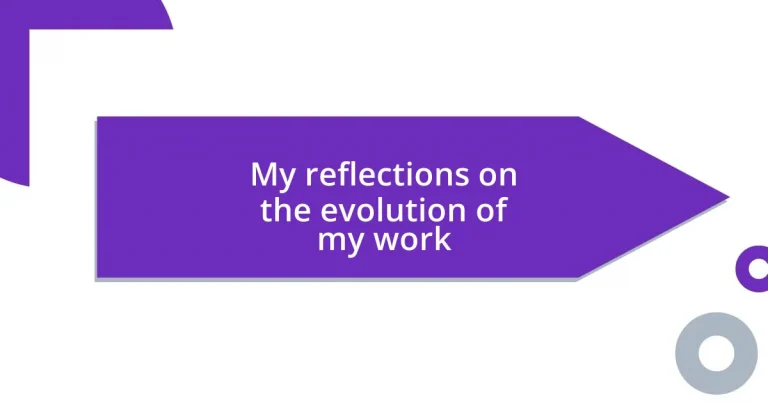Key takeaways:
- First job experience led to the realization of the importance of hard work and perseverance.
- Receiving the first promotion validated previous efforts and signified growth in the career.
- Embracing feedback transformed the approach to personal development and team collaboration.
- Adapting to change helped foster innovation and a proactive mindset towards future challenges.
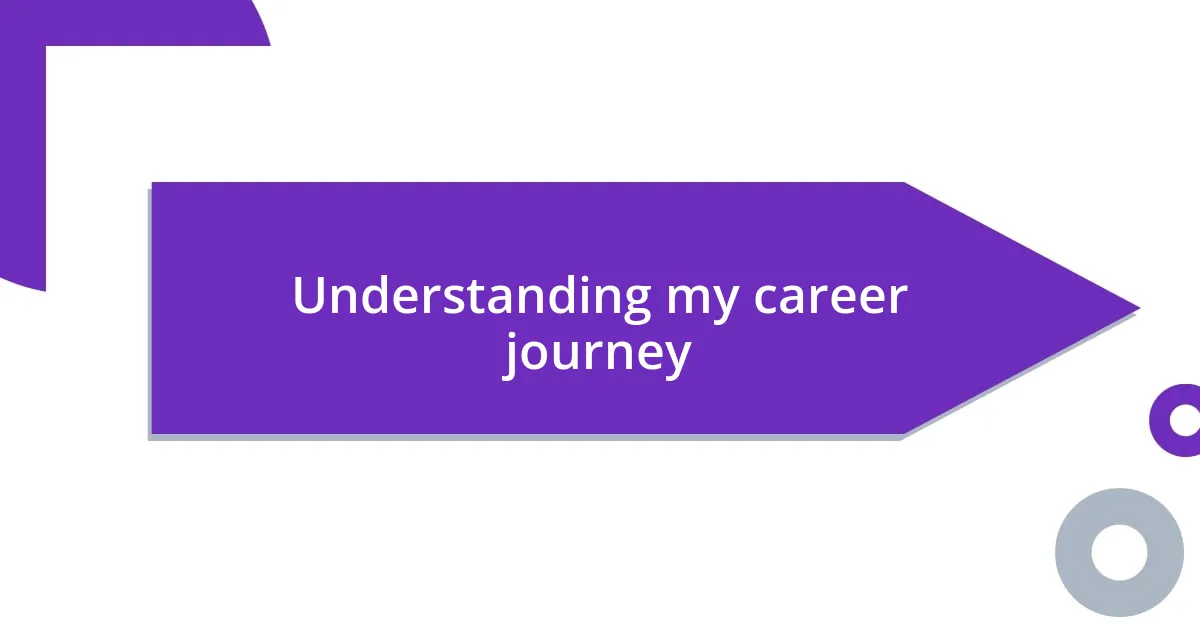
Understanding my career journey
As I reflect on my career journey, I often think back to that pivotal moment when I landed my first job. I remember the nervous excitement tingling in my stomach as I walked into the office, filled with the hope of carving out a path for myself. It was there that I learned the value of hard work and perseverance, realizing that every small task I completed was laying the foundation for my future successes.
During my early years, there were days when self-doubt crept in, making me question if I was on the right path. I vividly recall a particularly challenging project that almost made me give up. I had to ask myself, “What if I don’t push through this? What if I never discover my true potential?” That moment of reflection became a turning point, teaching me that growth often lies just beyond our comfort zones.
Looking back, I see how each experience—both the triumphs and the setbacks—shaped my understanding of what I wanted from my career. Have you ever thought about how your own experiences have shaped you? For me, each lesson learned was not just about achieving a goal but about discovering who I was and what truly motivated me. Embracing that journey has made all the difference in my professional life.
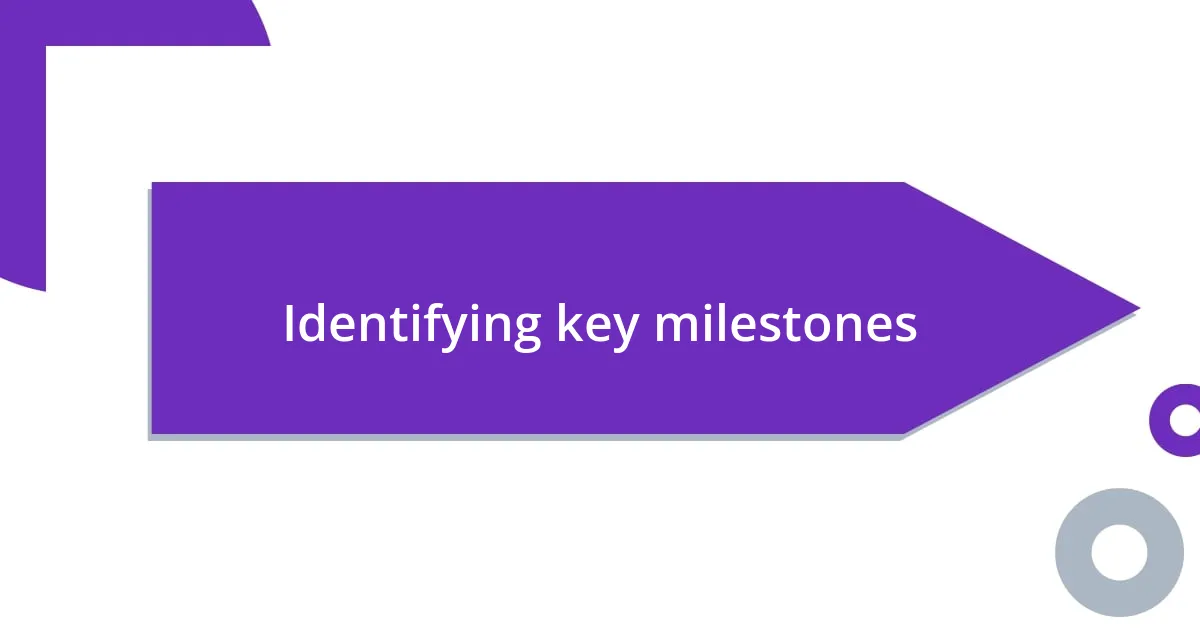
Identifying key milestones
Identifying key milestones in my career has been a rewarding exercise in self-discovery. One notable moment was when I received my first promotion. It felt like the universe was acknowledging all those late nights and early mornings. I vividly remember the moment when my manager called me into her office; my heart raced as I anticipated whether my efforts had truly paid off. When she shared the news, I realized that every small victory leading up to that point had contributed to this significant achievement.
- Securing my first internship, where I learned valuable industry skills.
- Completing a challenging project that earned me recognition from my peers and superiors.
- Attending a pivotal networking event that connected me with mentors who shaped my career.
- Receiving my first promotion, validating my hard work and commitment.
- Leading a team on a successful project, boosting my confidence in my leadership abilities.
Each of these milestones was not just a checkpoint; they were moments of growth that propelled me into the next stage of my journey. They served as reminders that persistence and dedication are what truly drive success. Reflecting on these highlights often fills me with a sense of nostalgia and gratitude for the path I’ve traveled.
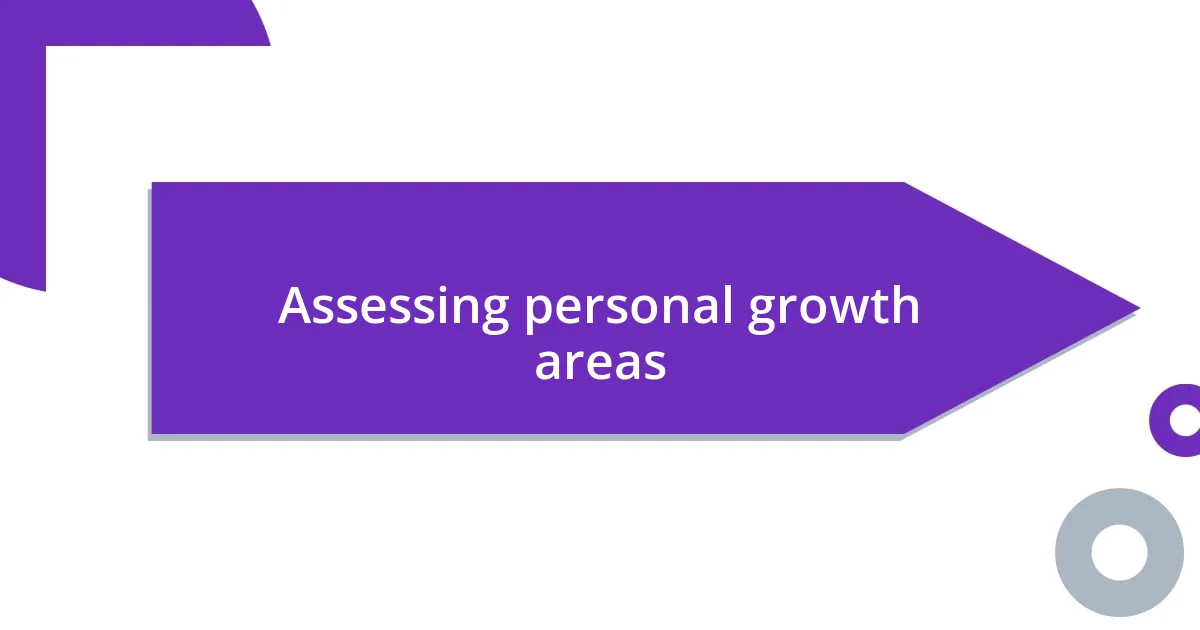
Assessing personal growth areas
Assessing personal growth areas is a crucial step in my journey. I often find myself taking stock of my skills and identifying where I can improve. For instance, I remember a time when I struggled with public speaking. After some honest self-reflection, I recognized that this was a vital area for me to develop. I enrolled in a workshop, and through practice and feedback, I not only improved my speaking skills but also gained confidence, which has been invaluable in my career.
Having a system in place to assess my growth areas has changed my perspective. I look back on my experiences and think about how they’ve influenced my current skill set. For example, I used to shy away from taking the lead on projects, fearing failure. However, after assessing my capabilities, I decided to embrace leadership roles by volunteering for team initiatives. This shift helped me realize that stepping out of my comfort zone made me more adaptable and resilient. I now see challenges as opportunities for growth rather than obstacles.
I believe that openly seeking feedback has also played an essential role in assessing my growth. One time, after receiving constructive criticism on a project, I was initially disheartened. Yet, I reminded myself that growth doesn’t come without some discomfort. By applying that feedback, I significantly improved my work, which ultimately led to receiving praise from my peers. Embracing this mindset has allowed me to view each assessment as an opportunity rather than a setback.
| Growth Area | Actions Taken |
|---|---|
| Public Speaking | Enrolled in a workshop to practice and improve |
| Leadership | Volunteered for initiatives to gain experience |
| Feedback Acceptance | Actively sought and applied feedback to improve performance |
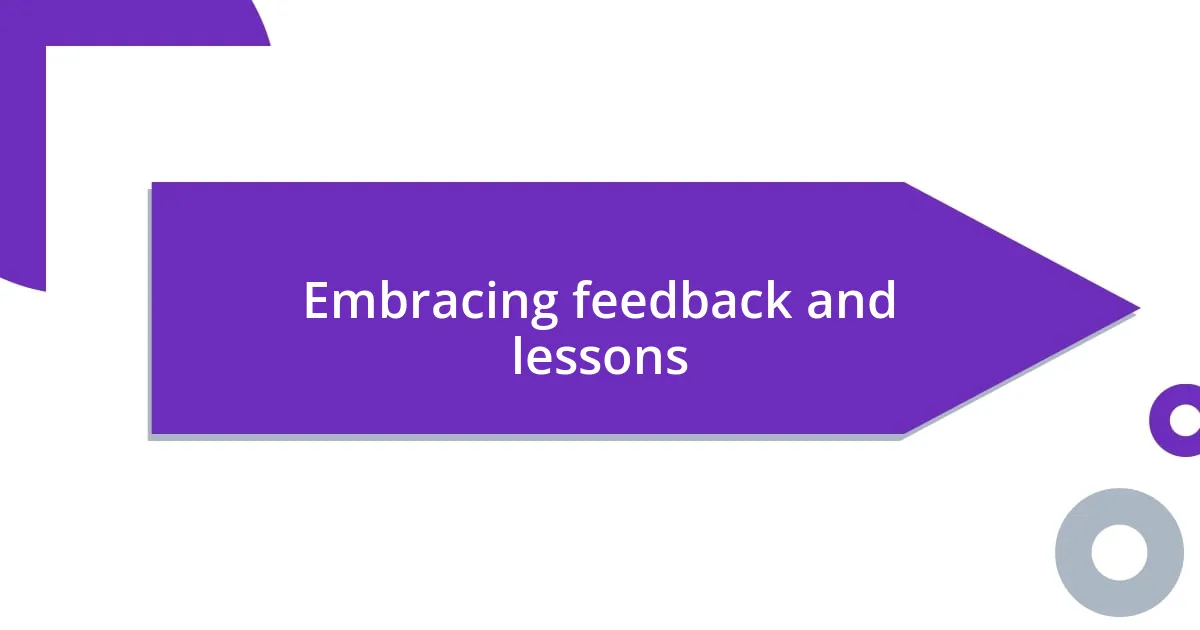
Embracing feedback and lessons
There was a time when I dreaded receiving feedback. I remember submitting a project I had poured countless hours into, only to be met with a detailed critique from my supervisor. Initially, I felt a wave of disappointment wash over me. However, after some reflection, I realized that this feedback was a treasure trove of insights. Instead of seeing it as a personal attack, I began to view it as a roadmap for my development.
One poignant experience stands out in my mind: during a team meeting, I shared my ideas, brimming with excitement. Yet, I noticed the mixed reactions from my colleagues. Afterward, I decided to ask for their thoughts—this simple act opened a floodgate of constructive criticism. They offered perspectives I hadn’t considered, and, to my surprise, I found that embracing their input not only refined my ideas but also fostered a deeper sense of collaboration that enriched our projects. What if I had shut myself off from their insights? Would I have missed out on the growth that followed?
Over time, I have learned to appreciate the lessons embedded in every piece of feedback. I’ve had moments where I confidently pursued an initiative, only to discover that my approach needed adjustment. Each of these experiences, though sometimes challenging, became stepping stones in my professional journey. I understood that learning is a continuous process, and embracing feedback became not just a necessity, but a powerful catalyst for growth. How liberating it is to shift from viewing feedback as criticism to seeing it as an essential part of my evolution!
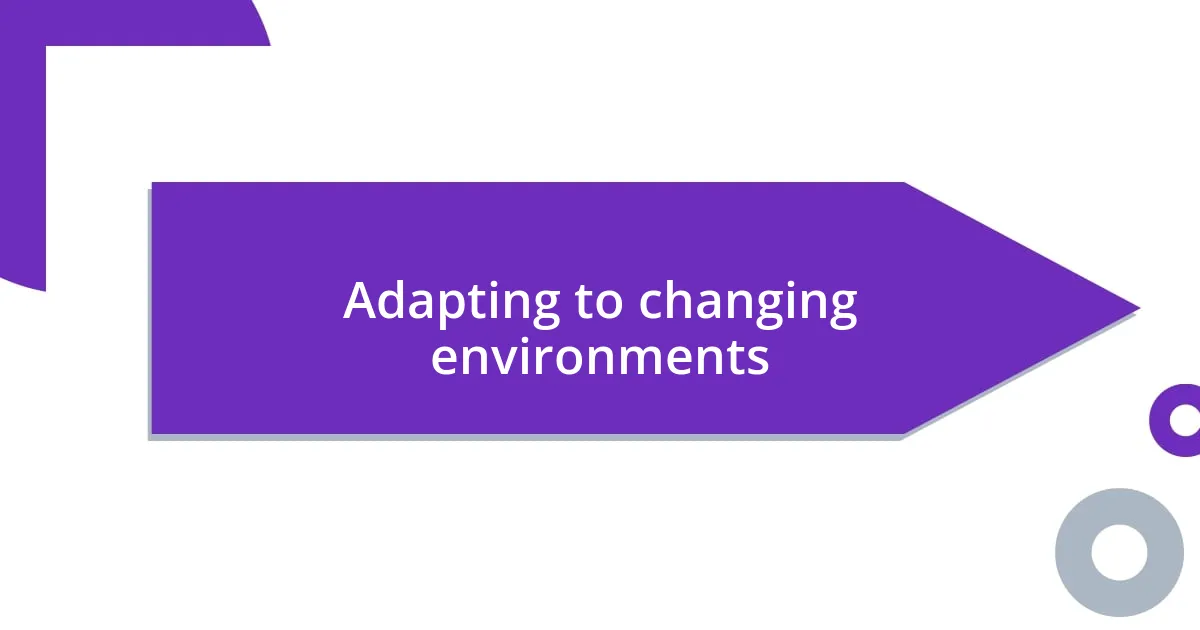
Adapting to changing environments
Adapting to ever-changing environments has been a defining aspect of my career. One time, when our team was tasked with implementing new software, I felt overwhelmed; it meant stepping outside of my comfort zone. However, rather than resisting the change, I took the initiative to familiarize myself with the system through online tutorials and group discussions. This proactive approach not only helped me adjust swiftly but also positioned me as a resource for my colleagues, reaffirming my belief that adaptability fosters growth.
I recall a project where unexpected market shifts forced us to pivot our strategy entirely. Initially, I resisted this change, fearing that my previous efforts would go to waste. But a mentor I trusted urged me to see the value in adaptability. After embracing this advice, I engaged in brainstorming sessions with my team to explore new directions. The result? What started as a daunting challenge transformed into an opportunity to innovate and collaborate, ultimately leading to a successful project outcome. How often do we cling to the familiar instead of embracing the new?
Throughout my journey, I’ve realized that adaptability isn’t just about reacting to change—it’s about anticipating it. I’ve made it a point to stay updated with industry trends and emerging technologies by regularly attending workshops and networking events. This commitment enables me to respond proactively when changes arise. I often ask myself, “What can I learn today that will prepare me for tomorrow?” By doing this, I’ve built a more resilient mindset that empowers not just me, but my entire team to face the future with confidence.
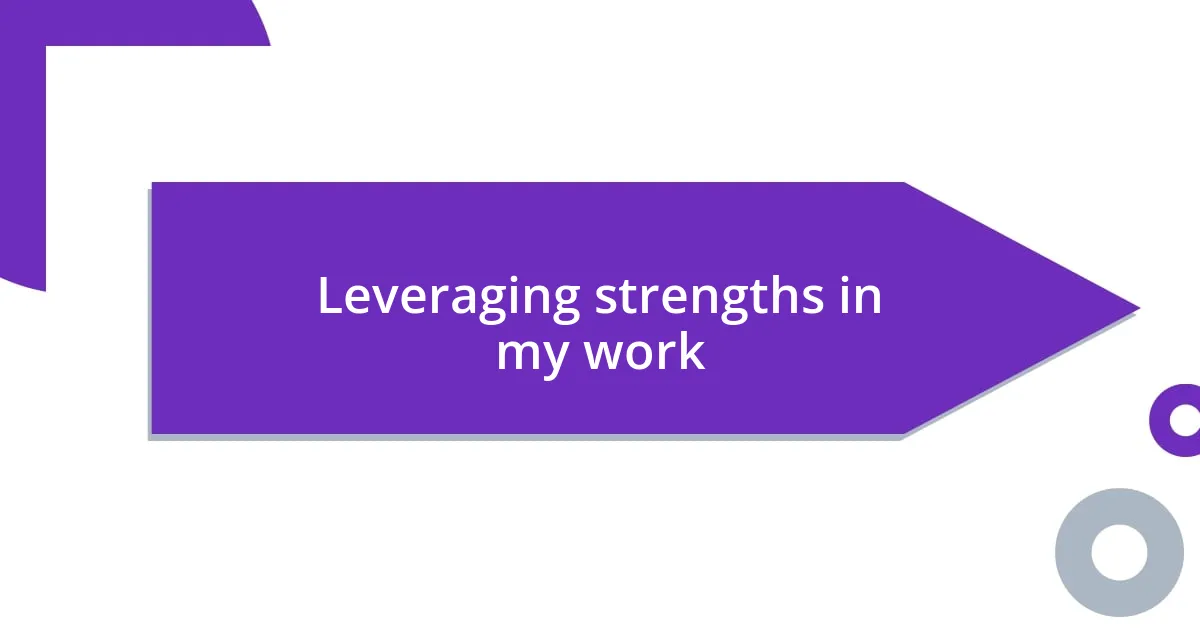
Leveraging strengths in my work
Leveraging my strengths in the workplace has truly transformed my approach to challenges. One significant strength I’ve discovered is my knack for problem-solving. I remember a time when our team faced a major roadblock that threatened our deadline. Instead of getting caught up in the stress of the moment, I took a step back, harnessing my analytical skills to dissect the issue. By breaking it down into manageable parts, I was able to propose a solution that not only met our deadline but also improved our workflow. Isn’t it fascinating how a single strength can pivot a situation from chaotic to manageable in a heartbeat?
Another strength that I’ve leaned into is my ability to communicate effectively. There was a project where miscommunication had led to some confusion among team members, and tensions were high. Recognizing the mounting frustration, I organized a quick huddle to clarify our roles and objectives. I shared my thoughts honestly but encouraged others to voice their concerns. This open dialogue not only eased the tension but also unified our team as everyone felt heard. Have you ever noticed how a simple conversation can shift the entire atmosphere of a project?
Finally, I’ve learned the power of enthusiasm in the workplace. My genuine passion for my projects often radiates through my interactions with colleagues, influencing their engagement. I recall the launch of a new initiative; my excitement was contagious, and I couldn’t help but share it during our meetings. When I saw the team’s energy skyrocket as they absorbed my passion, it reminded me of the impact mindset can have on morale. How much more effective could we be if we consistently infused our work with enthusiasm? Leveraging this strength has not only empowered me but has also led to a more vibrant work environment.
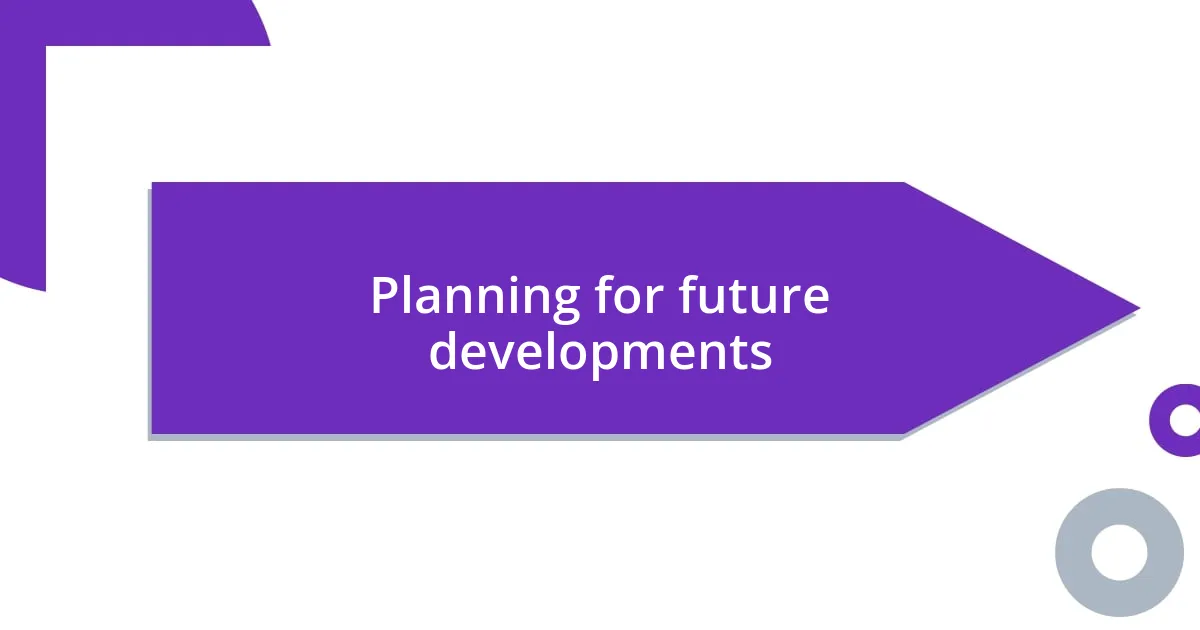
Planning for future developments
Planning for future developments requires a clear vision grounded in flexibility. I remember when I first started mapping out my career goals; I had a set plan that seemed foolproof. However, as I faced unexpected opportunities and setbacks, I learned that being open to recalibrating my plans often led to richer experiences. Isn’t it intriguing how life tends to unfold differently than we initially envision?
To stay ahead, I’ve embraced the habit of regular reflection. Every few months, I review my progress and assess what I’ve learned along the way. This practice has not only clarified my goals but also highlighted areas where I need to pivot or deepen my skills. I often challenge myself by asking, “What lessons from the past am I carrying with me into the future?” This ongoing introspection has become an essential tool in my planning process.
Engaging with mentors has also been pivotal in shaping my future developments. I vividly recall a discussion with a former supervisor who encouraged me to explore leadership opportunities within my organization. Her insights ignited a spark within me, prompting me to pursue early leadership roles that I hadn’t considered before. I now realize how critical it is to seek guidance and inspiration from those who have paved the way. Have you tapped into your network to discover new paths for your growth?












